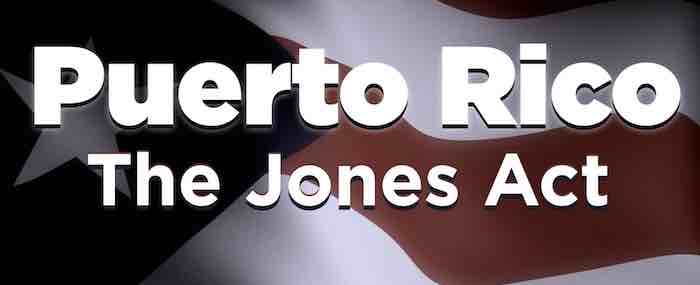
According to
several reports, the Trump White House is pursuing a permanent waiver to the Jones Act for Puerto Rico. This decision comes after the law received heavy criticism during last year's hurricane season when it was blamed for impeding emergency efforts in Puerto Rico during the aftermath of Hurricane Maria. In response to this criticism, on September 28, the Trump administration issued a 10-day Jones Act waiver for Puerto Rico to help support the emergency relief effort.
The Jones Act is a 1920 law mandating that only vessels that are built, crewed, owned, and flagged in the United States are allowed to participate in maritime shipping between domestic ports. By limiting the supply of domestic ships that are available to transport goods between American ports, the Jones Act raises shipping costs on those products; that cost is then
passed on to American consumers.
Back in September, I wrote
a more extensive post about the economic effects of the Jones Act and the impact it has on energy markets in the United States. The main takeaway from that article was that the Jones Act distorts the American energy supply chain by artificially raising the cost of moving products between American ports.
It is encouraging to know that the Trump administration is pursuing a permanent Jones Act waiver for Puerto Rico, but such a proposal
will be difficult to implement given the nature of the law. A permanent waiver of the Jones Act for Puerto Rico will require either a request from the Department of Defense or a finding by the U.S. Maritime Administration that there is a shortage of Jones Act-compliant vessels. On top of that, the Secretary of Homeland Security must also declare the waiver to be in the interest of national defense before it is issued.
Neither of these options seems likely as the Jones Act benefits both the
defense and
domestic maritime industries. This means that any permanent waiver for Puerto Rico, or any other territory for that matter, will likely require congressional support.
On September 28 of last year, Republican Senators John McCain of Arizona and Mike Lee of Utah, introduced a bill to permanently exempt Puerto Rico from the Jones Act, but the bill has received little public support from other members of Congress. Because of the
protectionist nature of the Jones Act, any push to change or discard the Jones Act will receive backlash from many Republicans and Democrats alike as members of both parties have
historically supported the law.
Political obstacles aside, the U.S. energy industry should welcome any attempt to amend or repeal this destructive law. In January, the U.S. East Coast had to resort to
importing heating fuels from Algeria and Norway because the Jones Act made it more economical for suppliers in Europe and Africa to cover propane shortfalls rather than the large distributors on the Gulf Coast. Repealing the Jones Act would prevent situations like this by creating lower shipping costs for products moving between the U.S. Gulf Coast terminals to refineries in Delaware Bay and across the Northeast. Furthermore, lower domestic shipping costs might allow the domestic shipping industry to take on a larger role in transporting oil, coal, and natural gas to other parts of the United States, helping to ease the burden placed on the energy supply chain by efforts to block the construction of new pipelines in various parts of the country.
The broader economic case for repealing the Jones Act in its entirety is rather clear: At its best, the Jones Act is economic protectionism that supports a few jobs in the maritime shipping industry at the expense of American consumers. At its worst, the Jones Act distorts the supply chain of entire industries, interferes with relief efforts following natural disasters, and contributes to a culture of cronyism in the American economy.
Institute for Energy Research——
Bio and Archives
The Institute for Energy Research (IER) is a not-for-profit organization that conducts intensive research and analysis on the functions, operations, and government regulation of global energy markets. IER maintains that freely-functioning energy markets provide the most efficient and effective solutions to today’s global energy and environmental challenges and, as such, are critical to the well-being of individuals and society.
 According to several reports, the Trump White House is pursuing a permanent waiver to the Jones Act for Puerto Rico. This decision comes after the law received heavy criticism during last year's hurricane season when it was blamed for impeding emergency efforts in Puerto Rico during the aftermath of Hurricane Maria. In response to this criticism, on September 28, the Trump administration issued a 10-day Jones Act waiver for Puerto Rico to help support the emergency relief effort.
The Jones Act is a 1920 law mandating that only vessels that are built, crewed, owned, and flagged in the United States are allowed to participate in maritime shipping between domestic ports. By limiting the supply of domestic ships that are available to transport goods between American ports, the Jones Act raises shipping costs on those products; that cost is then passed on to American consumers.
According to several reports, the Trump White House is pursuing a permanent waiver to the Jones Act for Puerto Rico. This decision comes after the law received heavy criticism during last year's hurricane season when it was blamed for impeding emergency efforts in Puerto Rico during the aftermath of Hurricane Maria. In response to this criticism, on September 28, the Trump administration issued a 10-day Jones Act waiver for Puerto Rico to help support the emergency relief effort.
The Jones Act is a 1920 law mandating that only vessels that are built, crewed, owned, and flagged in the United States are allowed to participate in maritime shipping between domestic ports. By limiting the supply of domestic ships that are available to transport goods between American ports, the Jones Act raises shipping costs on those products; that cost is then passed on to American consumers.